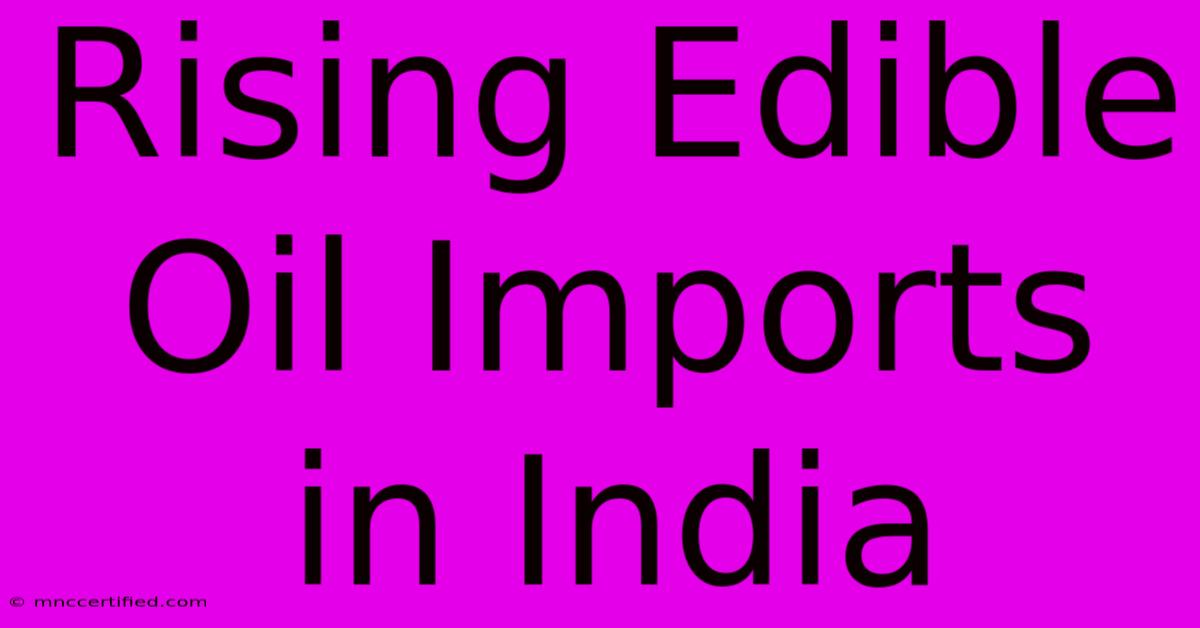Rising Edible Oil Imports In India

Table of Contents
Rising Edible Oil Imports in India: A Growing Concern
India's dependence on edible oil imports has been steadily climbing, transforming into a significant economic and political concern. This article delves into the factors contributing to this surge, the implications for the Indian economy, and potential solutions to mitigate the reliance on foreign sources.
The Steep Rise in Edible Oil Imports
India, the world's largest importer of edible oils, has witnessed a dramatic increase in its import bill in recent years. Several factors contribute to this alarming trend:
1. Growing Domestic Demand:
India's burgeoning population and rising disposable incomes have fueled a significant increase in the demand for edible oils. This increased consumption, particularly for healthier options like sunflower and palm oil, outpaces domestic production capabilities. Increased per capita consumption is a major driving force behind this import surge.
2. Stagnant Domestic Production:
Despite government initiatives, domestic edible oil production has remained relatively stagnant. Factors limiting production include:
- Low productivity: Yields from existing oilseed crops like soybean, mustard, and groundnut remain low due to various factors, including outdated farming techniques and a lack of access to quality seeds and fertilizers.
- Limited cultivable land: The availability of suitable land for oilseed cultivation is constrained, leading to insufficient production to meet the growing demand.
- Climate change: Erratic weather patterns and climate change are impacting crop yields, further exacerbating the production shortfall.
3. Global Price Volatility:
International edible oil prices are highly volatile, influenced by global supply and demand dynamics, geopolitical events, and currency fluctuations. These price fluctuations directly impact India's import bill, leading to significant cost pressures for consumers and the economy. Palm oil prices, for instance, have a significant impact on India's import costs.
4. Dependence on Specific Sources:
India's reliance on a few major suppliers for edible oil imports creates vulnerabilities. Geopolitical tensions or production issues in these countries can disrupt supply chains and cause price spikes. Diversification of import sources is crucial to mitigate this risk.
Economic and Political Implications
The high reliance on edible oil imports presents several significant challenges:
- Increased trade deficit: The substantial import bill adds to India's trade deficit, putting pressure on the Indian Rupee and potentially impacting macroeconomic stability.
- Price instability: Fluctuations in global prices directly impact domestic edible oil prices, affecting affordability for consumers, particularly low-income households. This price volatility poses a threat to food security.
- National security concerns: Dependence on foreign sources for a crucial commodity like edible oil raises concerns about national food security and strategic vulnerability.
Potential Solutions and Mitigation Strategies
Addressing India's edible oil import challenge requires a multi-pronged approach:
- Boosting domestic production: Investing in research and development to improve oilseed crop yields, promoting the adoption of modern farming techniques, and providing farmers with access to quality seeds and fertilizers are crucial.
- Diversifying import sources: Reducing dependence on a few key suppliers by exploring new import partners and diversifying the types of edible oils imported can help mitigate risks associated with supply chain disruptions.
- Promoting alternative oilseeds: Encouraging the cultivation of alternative oilseeds with higher yields and adaptability to local conditions can enhance domestic production.
- Strategic storage: Developing a robust system for storing edible oils can help buffer against price volatility and ensure supply during periods of scarcity.
- Import tariffs and policies: Strategic use of import tariffs and other policy interventions can help manage import costs and protect domestic producers.
Investing in sustainable agricultural practices is also crucial for long-term food security and reducing environmental impact.
Conclusion
The rising edible oil imports in India present a significant challenge requiring immediate attention. A comprehensive strategy that combines increased domestic production, import diversification, and strategic policy interventions is necessary to reduce dependence on foreign sources and ensure food security and economic stability for the nation. Ignoring this issue could have profound implications for India's economy and its citizens.

Thank you for visiting our website wich cover about Rising Edible Oil Imports In India. We hope the information provided has been useful to you. Feel free to contact us if you have any questions or need further assistance. See you next time and dont miss to bookmark.
Featured Posts
-
Wham S Hit Song Reaches New Peak
Dec 12, 2024
-
Historic Chico Mansion Destroyed By Fire
Dec 12, 2024
-
Kiwior Out Arsenals Predicted Team
Dec 12, 2024
-
Rangers Tottenham Europa League Key Stats And Head
Dec 12, 2024
-
Harris Resigns Millwall Boss Out
Dec 12, 2024